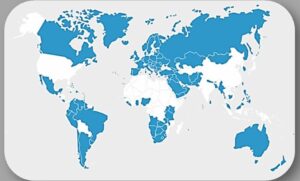
Source: https://www.ifrs.org/use-around-the-world/use-of-ifrs-standards-by-jurisdiction/view Adapted. Image: For demonstration purposes only.
The convergence of Sustainability and Financial Reporting.i
In ‘Who Controls the Rules Wins’ii, finance contributor George O’Dwyer, sets out why climate and financial reporting were moving toward alignment. Highlighted impacts on; share prices, investment returns, availability of finance and singled out a resource every stakeholder attributed value to i.e. money. Yet no platform existed, that directly linked or reported on the concomitant climate change and financial risks to the business. That changed at COP26.
At COP26 a long-standing entity, with global reach in financial reporting, and an array of not-for-profit sustainability advocacy organisations consolidated.
Before anticipating globally acceptable standards to report carbon emissions and verifiable financial impacts down to the company or individual level for the next 30 years, look to 30 years ago and arguably the defining moment for environmental awareness that followed an environmental disaster, EXXON Valdez, Alaska, 1989.
Follow the tanker name, the costs, CERES – an investor-led sustainability advocacy organisation founded in 1989, the Tellus Institute, UN Environment Program, Global Reporting Initiative, all the way up to the Value Reporting Foundation (VRF) in 2010.
Get quickly up to date, COP26, where the VRF and consortium of business and environmental organisations formed at the World Economic Forum in 2007, notably the Climate Disclosure Standards Board (CDSB), announced consolidation. Interestingly CDSB brought a reporting framework for environmental and climate change information in mainstream corporate reports.
All of these not-for-profit agencies contributed to reporting but as the impacts of change grew ever more acute the big question remained, how would the costs of transition to net zero carbon be financed?
At COP26, US Secretary of the Treasury, Janet Yellen commented, that “some have put the global figure between $100 and $150 trillion over the next three decades. At the same time, addressing climate change is the greatest economic opportunity of our time.”
Financing this economic opportunity of our time would surely require the resources of the proverbial “Bank of England” and then some.
Enter, former governor of the Bank of England, Mark Carney, UN Special Envoy for Climate and Finance, and Chairman of the new Glasgow Financial Alliance for Net Zero (GFANZ). Carney told the conference of parties that GFANZ represents forty percent of the world’s financial institutions, investors, and insurers with $130 trillion in funds – available for sustainable finance.
2030, 2050 and 1.5° climate change mitigation agendas are well-rehearsed but investors participate only when change events and opportunities are capable of being expressed in money – internationally comparable risk and return, financial reporting terms.
With money, perhaps enough money, now openly on the sustainability agenda, if not yet on the table, what would investors need to begin to scale up the sourcing, comparison, and assessment of costs, risks, and economic opportunity in sustainability and circular economy projects in diverse jurisdictions worldwide?
Enter – International Financial Reporting Standards Trust (IFRS), the long-standing, not-for-profit, public interest organisation that successfully developed a single set of investor-focused, high quality, enforceable, and globally accepted financial reporting standards.
Again at COP26 the IFRS announced it now has two aligned standards boards, financial and sustainability.
The first, the International Accounting Standards Board (IASB) has been around since 2001 its precursor 1973, formed through an agreement made by professional accountancy bodies on four continents. Its reporting standards have been adopted globally by Accountants in business and professional practice and relied upon by investors as their standards under which they and clients present financial information.
Its new board the International Sustainability Standards Board (ISSB) will sit alongside its financial accounting counterpart and work to build on the VRF and CDSB standards brought to the Trust through amalgamation.
With prototype standardsiii now published, by the IFRS Technical Readiness Working Group, professional advisors and businesses can begin to make ready.
The ISSB is expected to move from prototype to propose global base standards by Q3 2022 and after consultation and due process adopt them by Q4 2023.
Pro-active businesses should develop resilience by committing to change management in the meantime as advisers align competence in Materiality Assessments, Emissions, Benchmarking, Environmental Management Systems, and Reporting competence.
Sustainable Finance clients, all business clients have a choice between a crash landing and a planned one. As costs, the price of carbon, of climate change inexorably rise, the delay will mean they will bear greater; physical, transition (structural\policy change) risk, and pay more.
Human economic activity, and the methods adopted to exploit natural resources, drove greenhouse gas emissions to the limit of their natural, life-sustaining, level. Our new imperative is to make alternative wealth creation choices, constrained by both environmental and financial considerations.
Governments will move to clarify and legislate for their climate change policies and some money flows will be driven through multilateral banks, and tax changes.
Investors will start to make more, bigger, sectoral, structural, and country scale investments as they are de-risked by that policy backing and leverage brings higher returns on any private capital employed.
As sectoral and state-wide change accelerates businesses will act to mitigate their risks and participate in business and economic opportunities.
Important because it’s important, this now involves environmental, social, and governance reporting which must be verifiable and concomitant money issues, so reports will have to be auditable.
To balance the Sustainable Finance balance sheet the debit and credit sides will both have to ‘go green’. The suppliers of finance and investment and those that need it will have to find each other, a common albeit competitive, purpose.
Financial and Sustainability reporting converged.
i Author: George O’Dwyer. Consultant, former executive at state development Bank ICC the conduit in Ireland for EIB multilateral investment funds, Banker, Marketing and later General Manager – Commercial for an EU Bank-Insurer’s subsidiary interests in Ireland ii September 2021, “Who Controls the Rules Wins”, George O’Dwyer.
iii General Requirements for Disclosure of Sustainability-related Financial Information Prototype. Climate Related Disclosures Prototype and Climate-related Disclosures Prototype Supplement: Technical Protocols for Disclosure Requirements.


